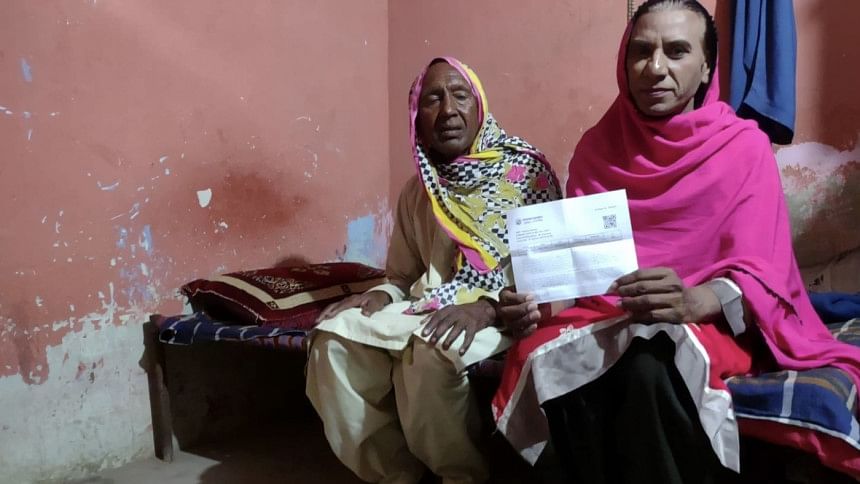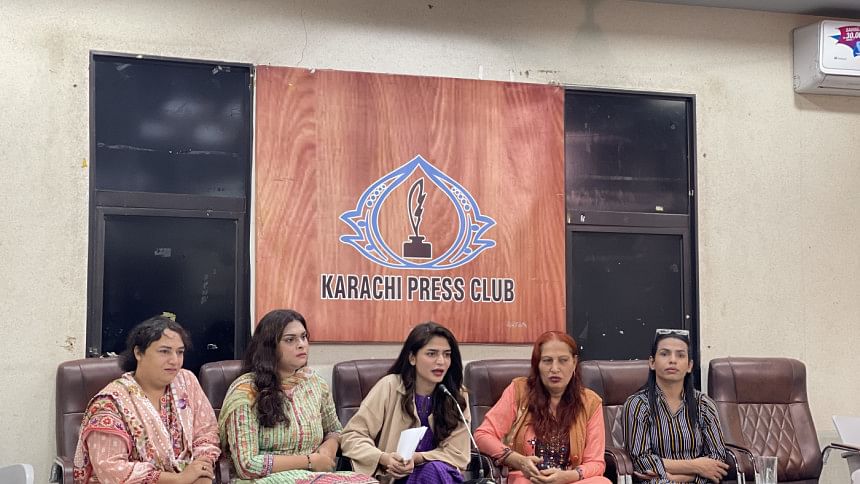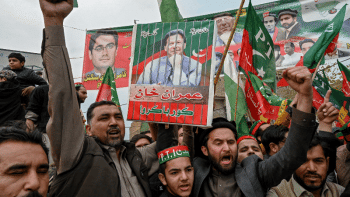Pakistan elections 2024: Widespread exclusion of the Trans community

A significant number of trans persons residing in Karachi, Pakistan, lack Computerised National Identity Card (CNIC) identifying them as "X" gender. This proves a major challenge for their participation in the upcoming elections on February 8.
The participation of the transgender community in Pakistan, roughly comprising 500,000 people, according to TransAction Pakistan, in the upcoming elections will likely be marred by various barriers. This includes difficulty in obtaining or renewing CNICs, exclusion from voter lists, inadequate awareness regarding the importance of voting, and challenges on the voting day itself such as financial constraints related to transportation expenses and discrimination encountered at polling stations, particularly due to the segregation of polling booths into male and female sections, which restricts access for transgender individuals.
According to estimates by Gender Interactive Alliance (GIA), there are roughly 22,000 registered trans persons in Karachi alone, informed Zehrish Khanzadi, programme manager of GIA.
On polling day, trans people fear having difficulties accessing polling booths due to discrimination and stigma because there are separate polling booths for males and females in Pakistan.
According to the 2023 census count, there are at least 3,871 members of the community in Sindh. This is a significant drop—of roughly 35 percent —from 2017 when the count was 5,954 in Sindh. Back then, the total count of transgender members was 21,774 in Pakistan.
As per data shared by the Election Commission of Pakistan (ECP), 549 transgender persons are registered as voters in Sindh, 2,260 in Punjab, 162 in Khyber Pakhtunkhwa (KP), 101 in Balochistan and 12 in Islamabad Capital Territory.
The exclusion of the transgender community from census and voter lists has been exacerbated by concerns within the community when objections were raised against the Transgender Persons (Protection of Rights) Act of 2018. In May 2023, the Federal Shariat Court (FSC) ruled against the Act stating that transgender people cannot change their gender, following which, the National Database and Registration Authority (NADRA) halted the "X" NIC registration, renewal and modification. "This infringes the right of trans persons to participate in the democratic process," said Aradhiya Khan, a trans activist and project officer at GIA.
After the trans community challenged the Islamic court's decision in the Supreme Court in July, 2023, NADRA resumed issuing ID cards to transgender people in September after a four month pause. Transgender law remains intact until the appeal is decided.
Khanzadi said that despite the directive, "some members of the transgender community in Karachi were asked to present medical certificates when they went to NADRA to renew their 'X' category CNICs. Their CNIC renewals were consequently denied." As a result, many of them will not be able to cast their vote in the upcoming elections.
Perils of transgender persons
Eraj Aftab, 29, a transgender person residing in Karachi, has not been able to update her address on her "X" gender CNIC.
"I wanted to update my temporary address from North Karachi to Baldia Town because my family no longer lives there but NADRA asked me for a medical certificate although I already have an 'X' gender CNIC, which was renewed in 2023," Aftab said.
Aftab explained that she was approached by a political party to allot her a reserved seat in local council but she was robbed off that opportunity to represent her community as a local body representative due to the address change issue.
Ghuria Baloch, a Karachi-based transgender person with an "X" ID card, also shared her dilemma. "I took one of my friends to the NADRA office located in Defence in January. They refused to change her Male card to an 'X' CNIC citing they are not allowed to do that," she said.
She mentioned that transgender persons even face discrimination in government offices. "There were no separate queues for us. If we stand in the male queue, we face harassment and if we stand in the female queue, they feel uncomfortable and tell us to stand at a distance," Baloch said.
The Peshawar High Court has directed to arrange separate queues for transgender members at PK-81 polling stations—where a transgender person is a candidate—in Peshawar, KP.
According to trans activist and lawyer, Nisha Rao, there is also hesitation among some trans community members in obtaining "X" category cards due to potential travel limitations, particularly to countries like the United Arab Emirates or Saudi Arabia, for religious pilgrimages.
Entering election race
Rao said it's a positive sign that transgender people are running for provincial and national assembly seats in Pakistan, but they face numerous challenges.
"I believe the filing fees for transgender candidates should be waived," she said. The fee for submission of a nomination paper is non-refundable. It is currently PKR 30,000 for a national seat, and PKR 20,000 for a provincial assembly seat.
Rao lamented that political parties have little interest in integrating transgender individuals into the electoral system, adding that seats are not allotted for them in the elections.
She said that even for the 2024 elections, the two candidates, Nayyab Ali from Islamabad and Sobia Khan from Peshawar, will be contesting as independent candidates, which highlights the lack of party inclusion. Ali submitted her nomination papers for the National Assembly seat NA-47 Islamabad and Khan for the Provincial Assembly seat PK-81.
In 2023, the Sindh cabinet approved reserved seats for transgenders in the local council, symbolising a step forward in inclusivity. In June, 2023, Shahzadi Rai from Pakistan Peoples Party (PPP) and Chandni Shah, backed by Jamaat-e-Islami (JI), took oath as the first transgender members of the Karachi Metropolitan Corporation (KMC) City Council on reserved seats. Khanzadi took oath as an intersex member of Safoora's Town Municipal Corporation—the local government entity responsible for providing municipal services within a specific area in the city of Karachi.
Trans activists in Karachi are now demanding reserved seats in general elections, enabling them to better represent their community at the national and provincial level. "No political party has held any meetings or announced reserved seats for transgender persons. Unless political parties empower us politically, we won't be able to come forward and speak for our rights," Rai said.
Blindsided by the electoral process

The transgender community was overlooked during the voter registration process. "Despite discussing with the Election Commission of Pakistan (ECP), and advocating for a representative well-versed on transgender issues, no tangible actions were taken to address this concern," Khanzadi said.
Trans activists claimed in a press conference held in Karachi recently that, "approximately 1,000 individuals [transgender persons] from the voting registry" have been excluded because the ECP insisted on revising the electoral registration process for transgenders despite the community providing voter registration numbers.
"They haven't registered many of us as voters; they don't consider an 'X' card enough to render us a person with the right to vote, which is a grave human rights violation," said Rai, who was leading the press conference.
Another issue is that many transgender persons do not have their current address updated on their ID cards, but instead have their hometown address listed on it. This led to them not being registered in the voter list, making it challenging to vote from their respective areas or constituencies.
"The majority of trans persons living in Karachi have relocated from other parts of Sindh or South Punjab. However, their ID cards still bear addresses from their hometowns, which poses a challenge," Rao said.
Kisho, a resident of Hijrat Colony in Karachi for a decade, originally hails from Bhawalnagar. She begs at signals and dances at gatherings to make ends meet. Like every year, she will cast her vote this year but it's registered in her hometown in Punjab.
"I have booked a train ticket with my own hard-earned money and I am travelling soon to Bhawalnagar to cast my vote from PP-243," she said.
Her friend, Shani, 45, sitting next to her, lamented, "We fulfil our duty to vote in elections but how does it benefit us?"
Shani's vote is registered in PP-237 in Bahawalnagar but she might not be able to travel due to health issues. She said, "I have not changed my gender from male to "X" on my ID card because my family might not give me my rightful share of inheritance as they do not accept my trans identity."
Trans activists emphasise that the government and relevant authorities should provide easier mechanisms for the trans community to update their addresses on identification cards and ensure their inclusion in voter lists.
The trans community also faces barriers related to travel expenses and accessibility to polling stations—resulting from discrimination they have to deal with, on a daily basis. Rao said that addressing transportation issues on election day by providing support or facilities for the transgender community, could encourage their participation.
"They may believe that going to vote would be a waste of their day. It's difficult for them to spend 1000 to 2000 rupees on transportation when they struggle to earn enough money to survive," she said.
On polling day, trans people fear having difficulties accessing polling booths due to discrimination and stigma because there are separate polling booths for males and females in Pakistan.
Sana Khan, a trans voter registered in PS-62, Hyderabad, is aware of the importance of exercising her right to vote but she fears gender discrimination on voting day. "I have previously cast my vote as a male voter. This time around I have a 'X' CNIC card so I am confused whether I will be told to cast my vote in male or female booth. I worry about how people will treat me," she said.
This is also true for Kisho, who will go to the polling station in her hometown, disguised as a male voter due to societal discrimination and unacceptance.
Steps for inclusion
Syed Abdullah Shah, deputy director of gender and social inclusion in ECP Sindh, shared details of their initiatives for the inclusion of transgender community in the electoral process such as registering over 3000 transgender voters and ensuring their representation in the ECP Gender and Disability Electoral Working Group. Tailored solutions, gender-sensitive training for election staff, voter awareness sessions, and media outreach programs are some of the other measures taken by them
GIA took proactive steps by organising voter rights awareness sessions for transgender individuals across various cities in Sindh, including Karachi, Hyderabad, Sukkur, and Jacobabad.
"We mobilised 20 to 25 transgender individuals in each city through focus group discussions, interactive sessions, and capacity-building workshops," Khan shared.
These efforts are aimed at empowering transgender persons with essential knowledge about the voting process.
But Rai believes that political parties have a huge role to play in mobilising transgender persons to take part in political and electoral processes.
Unfulfilled manifestos and promises
In its manifesto, Pakistan Tehreek-e-Insaf (PTI) has focused on enhancing access to higher education, particularly for underrepresented groups like transgender persons. Pakistan Peoples Party (PPP) has pledged to implement the Transgender Persons (Protection of Rights) Act 2018 as well as facilitate transgender persons' participation in political processes.
Pakistan Muslim League-Nawaz (PML-N) is committed to protecting equal opportunities for transgender individuals in education, health, social protection, and employment. They advocate for penalties against discrimination and degradation of transgender people across all societal levels. The party also commits to providing identity documents to transgender persons. Awami National Party (ANP) has pledged to resist oppressive laws against transgender individuals, advocating for their rights in private institutions, special quota in government jobs, and provision of easy loans.
Despite the promises made in manifestos by political parties regarding transgender inclusion, they have been excluded from general elections, revealing a significant gap between rhetoric and action. Hence, it remains a distant dream for transgender individuals to secure representation in Pakistan's parliament.
This is an exclusive report to The Daily Star's "Geopolitical Insights," by Hamna Baig, a Karachi-based fact-checker at Soch Fact Check, an IFCN signatory and a producer for Soch Videos.
Any views expressed in this article does not represent the views of the paper.
We welcome submissions of exclusive reports, analysis and thought pieces on global events. To submit to Geopolitical Insights, please send an email to [email protected]

 For all latest news, follow The Daily Star's Google News channel.
For all latest news, follow The Daily Star's Google News channel. 










Comments